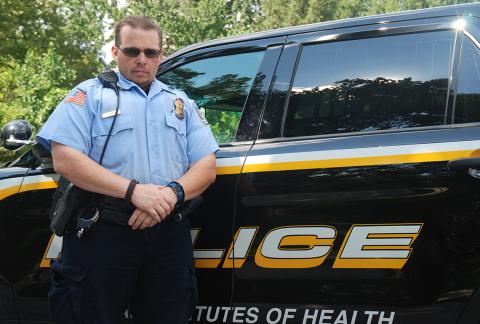Local Hero
NIH Police Officer Pulls Driver from Burning Car

Photo: Eric Bock
When Cpl. Kyle McKee of the NIH Police saw the burning car, he knew he had to do whatever it took to save the driver’s life.
On July 1, McKee was driving home from work at Ft. Detrick on the Baltimore Beltway. At about 2:20 a.m., a Lexus sedan crashed head-on into a concrete wall. The car bounced off the wall, came to a stop in the road and burst into flames.
“Without regard to his personal safety, Cpl. McKee extended the life of a helpless and unresponsive driver of a car engulfed in flames,” said NIH Police Chief Alvin Hinton. “He deserves recognition for valiantly extending the life of another human being, while risking his own.”
McKee pulled over after he saw the accident, as did another man who was filming the wreckage. He called 911 and went over to help the driver to safety. All he could think was: “How do I get to the car fire, get the driver out and away from the car and keep him alive?”
The doors were locked, the windows were up and the driver was slumped over the steering wheel unresponsive, despite the officer’s attempts to get his attention. McKee’s training took over.
He broke the car’s window with a utility knife and unlocked the doors. He tried to pull the man to safety. However, McKee had trouble getting the man out. At this point, the man filming put down his camera and started to help. McKee went around to the front passenger’s side, unbuckled the driver’s seatbelt and pushed him out while the other man pulled the driver from the other side.
As soon as the driver was out, McKee tried to get out. But the door wouldn’t budge and the car filled up with smoke. He kept his wits, climbed over the vehicle’s console and jumped through the driver’s door. He dragged the man 200 feet away from the accident as the fire spread.
Once Maryland State Police and medical personnel showed up—the “cavalry” as he calls them—McKee called his police dispatcher to explain what happened, filed a report and went home.
McKee has had to make split-second decisions before. Prior to joining NIH, he worked for the Department of Homeland Security. He assisted with the Federal Emergency Management Agency’s efforts to rebuild New Orleans and other areas on the Gulf Coast for almost 7 months as the region recovered from Hurricane Katrina.
“When you’re running into a dangerous situation, you’re not thinking about yourself,” he said. “You’re focused on getting the person in danger out of danger.”—Eric Bock
